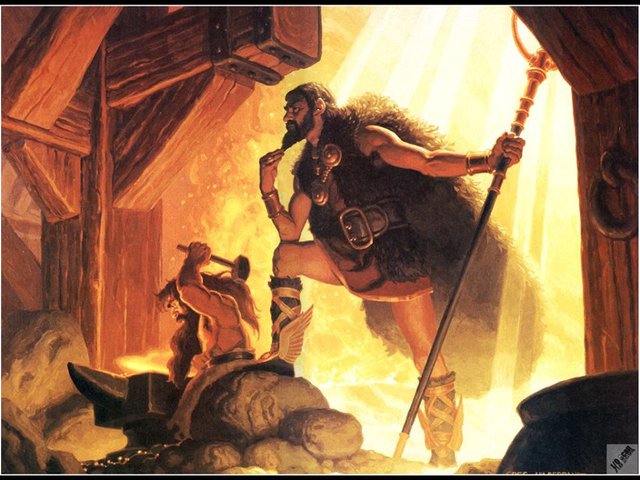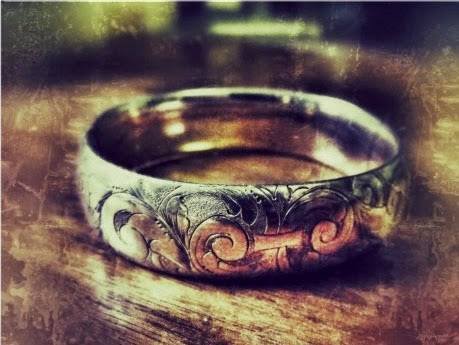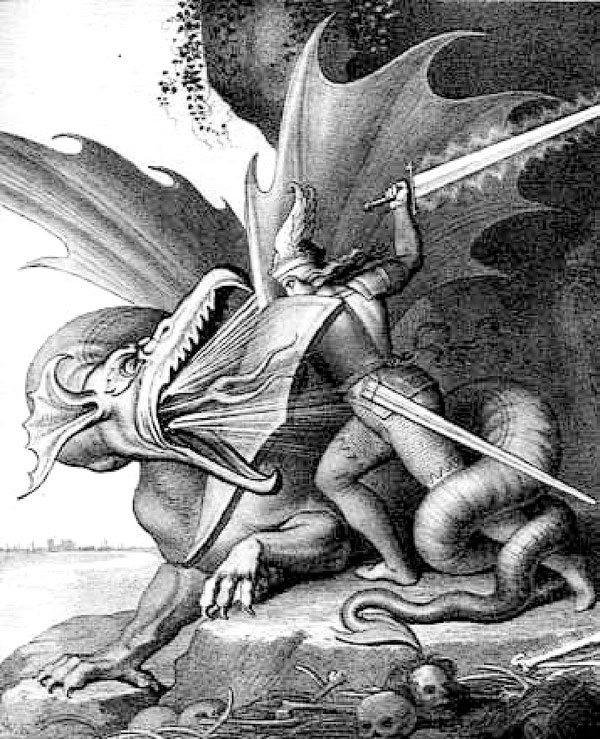Nordic mythology: The cursed ring
THE DARK RING

Hreidmar, a king of the dwarves, had three sons: Fafnir, the eldest, possessed a courageous soul and a strong arm; Otter, the second, was astute and had the power to change shape at will; Regin, the smallest, was possessor of vast wisdom and great ability of hands. To please the greedy Hreidmar, his youngest son built for him a house lined with shining gold and precious gems. Fafnir was in charge of guarding her and no one even dared to approach.
One day, Odin, Hœnir and Loki, disguised as human beings, came to the kingdom of Hreidmar in one of his many expeditions to test the hearts of men. As they approached the house of Hreidmar, they crossed a stream and Loki caught sight of an otter that was basking in the sun. It was actually Otter, the second son of the dwarf, who had taken this form to go fishing. The evil god killed the otter of a stone and threw his body over his shoulder, thinking that he would then serve them to prepare dinner. When he entered the house of Hreidmar, as soon as the dwarven king saw the dead otter, he entered into a rage, for he had recognized his son immediately. Before the gods could do anything, Hreidmar locked them up and declared that they would never regain their freedom unless they could satisfy their greed by giving them enough gold to cover the otter's body inside and out. It did not seem so difficult, especially for a god.
The gods agreed and began to empty their pockets of all the gold they carried with them. But the skin of the otter began to grow and grow, so much so that the gods realized that soon enough gold would not exist in the world to cover it. Having nothing left, Hreidmar agreed to release one of them, to serve as an emissary and to bring more gold to pay the ransom. The chosen one was Loki, who quickly went to the cataract where lived the dwarf Andvari, famous for its vast riches. This dwarf had once pretended the love of the Undines, guardians of an immense amount of gold at the bottom of the Rhine. To ensure that the gold was not stolen, Odin had cast a curse on him: whoever wanted to get it would have first than to renounce love. But Andvari had already been rejected by the Undines and his hope of knowing love had died at that moment. Cursing love, he stole gold from the Undines and with a part of him forged a magic ring. It was Andvaranaut ("the gift of Andvari"), a magic ring that ensured that its possessor would always have immense riches, as it attracted gold like a magnet.
Loki searched for Andvari for a long time in the waterfall, but all he found was salmon swimming against the current, as is his custom. He reasoned very shrewdly that Andvari could hide under that form, so he visited Ran, the evil goddess of the sea, and borrowed his net. With it, he captured Andvari and the dwarf, to save himself, had no choice but to give him all the gold he possessed, but Loki realized that the dwarf was trying to hide a gold ring, Andvaranaut himself. Loki snatched it away laughing, not before the dwarf cursed at the possessor of the gold that the god stole from him. That gold would only bring misery to its owner.
Upon returning to Hreidmar's house, Loki realized that the treasure he had brought would not be enough; the skin of the otter had grown in its absence, and now reached enormous proportions. He deposited all the gold he had brought with him, and at last he remained with only the ring, which he intended to retain for himself. Andvari's curse was beginning to take effect. Loki also had to deliver the magic ring and was left with nothing. However, Hreidmar kept his word and released the gods, who left immediately.

Fafnir and Regin, contemplating so much gold, began to lust for themselves a part, but his father was so greedy that he did not plan to share anything with them. Then the eldest son, fafnir, murdered his father to seize the treasure. When Regin realized what had happened, he asked his brother for his share of the inheritance, but Fafnir, furious, told him that if he appreciated his life, he would leave immediately and find a way to earn his living.
Furious and without a penny in his pocket, Regin had to leave. But revenge began to grow in his heart. Years passed and Regin patiently awaited the opportunity to take revenge on his brother. During that time, Fafnir discovered that among the treasures stolen from Andvari was also Huliðshjálmr ("helmet of terror"), a helmet that allowed the wearer to take any shape or even become invisible. So Fafnir, full of greed, was transformed into a dragon to be able to better guard his treasure and was delighted to wallow in the gold in the cave of Grítaheid ("glowing furnace").
Meanwhile, Regin entered the service of King Elf, as guardian of his stepson Sigurd. The dwarf dwarf knew that Sigurd could become the instrument of his revenge. Regin trained Sigurd in the use of sword, spear, shield and all kinds of weapons, in exchange for the promise to obey him, when the moment arrived, without asking anything.When Sigurd reached the stature of a warrior, Regin knew that the moment of his revenge had come. He told the young man to ask his stepfather for a horse, to which the king consented. Sigurd went to see Gripir, the keeper of the stables, and he told him to choose for himself the horse he wanted. While Sigurd was going to the field, where the horses grazed, he met a strange one-eyed man. This one told him to lead the horses to the river and to choose the horse that crossed the water faster. So Sigurd did, and the chosen horse was Grane, descendant of Sleipnir, the horse of Odin.
The journey of the hero began and as they crossed the sea, Sigurd witnessed a prodigy. A man was walking on the water toward the ship. Sigurd invited him to approach, and this man, who called himself Fiöllnir, taught him how to distinguish the royal and false omens. In fact, it was Odin, but Sigurd never suspected his identity.
When they reached the shore, Regin led Sigurd through the mountains until they reached Grítaheid. Then the dwarf told him the story of his family, how his brother had taken possession of the portion of the treasure he had inherited. However, Regin admitted being too cowardly to face his brother, so he needed Sigurd's help to carry out the feat. As Sigurd continued walking alone into the cave, a stranger with a single eye approached him and told him to dig numerous trenches in the way the dragon had to take as he left his cave to go to the river to drink water. Then he told her to hide in one of the trenches and waited for the dragon to pass over him, so he could nail his sword to her belly. Sigurd gratefully followed the instructions of the one-eyed man and succeeded in killing the dragon that very day. Soon the dragon came out of his cave to quench his thirst. As he crawled on the ground, he had no choice but to step over the trench where Sigurd had hidden himself. He took his Gram sword ("wrath") and, armed with courage, pierced Fafnir's heart. A huge lake of blood formed there where the dragon was killed.
Regin, seeing his protege victorious, came out of hiding. Surprisingly, he accused Sigurd of murdering his brother, but said he would be satisfied if Sigurd, took the dragon's heart and roasted it so he could eat it. Sigurd did as he was told, and soon Fafnir's heart was prepared and served. To prove that he was properly cooked, Sigurd touched that hideous dish with his fingers and, being too hot, burned his fingers, which he instinctively brought to his mouth. As soon as Fafnir's blood touched his lips, Sigurd discovered, to his great surprise, that he could understand the language of birds, many of which had gathered there to eat carrion. A raven on the branch of a tree warned him not to give Regin the dragon's heart, and instead to eat it himself. He also explained the manipulation of which the dwarf had made him an object, turning him into merely an instrument of his malevolent plot to recover a treasure that, in any case, did not belong to him. Then Sigurd killed Regin. The curse of Andvari claimed another victim. Then he took the heart and ate it, except for a small part he kept to eat at another time.
One more thing revealed to him that raven, if bathed in the blood of the dragon while it was still warm, his skin would be completely invulnerable from any damage. Sigurd stripped himself of all his clothes and did as suggested by the bird, but as he jumped to plunge into the lake of blood, a blade of linden stuck behind his back. This single point was not bathed by blood and became the only vulnerable spot in the body of the warrior. He then toured the cave of the dragon where he found immense riches, all stolen from Andvari, as well as the Andvaranaut ring and the Huliðshjálmr helmet. He loaded his horse Grane with as much wealth as he could and left.

I love this story! Thank you. It makes me wonder, it is kind of like Achilles from Greek mythology then, in that he had one weak spot. I wonder how the stories compare. But of course, in Norse, only bathing in the blood of a dragon would give you that power!